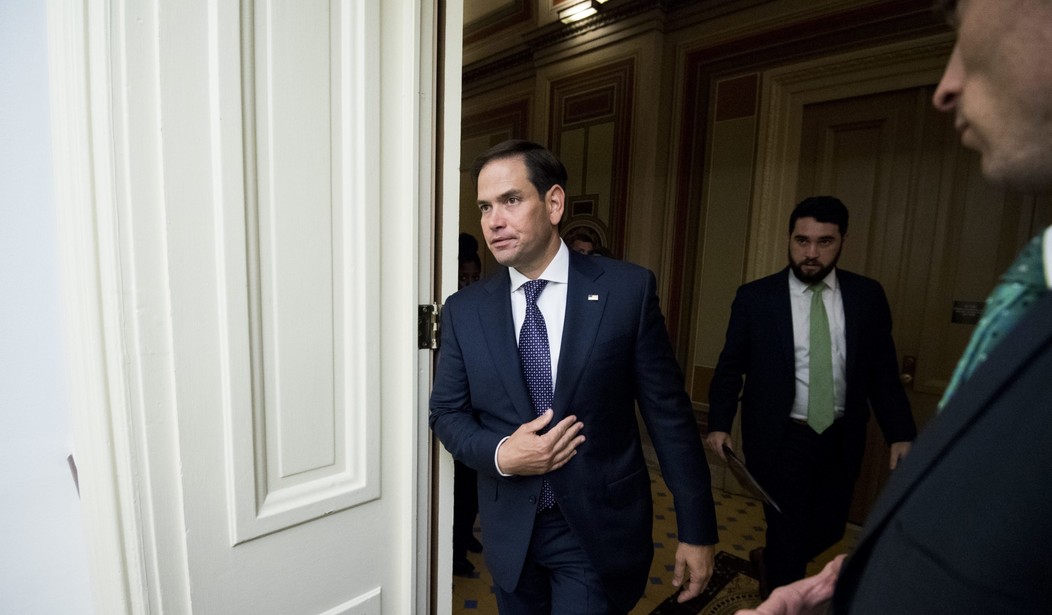WASHINGTON – Sen. Marco Rubio (R-Fla.), a member of the Senate Intelligence Committee, warned that Russian President Vladimir Putin won’t acquiesce to President Trump’s reach for a “win-win” deal as the Russian leader is only interested in a “zero-sum” world order that sees the United States weaker.
At Trump’s joint press conference with Putin in Helsinki today, Trump was asked if he holds Russia “accountable for anything in particular.”
“Yes I do. I hold both countries responsible. I think that the United States has been foolish. I think we’ve all been foolish. We should’ve had this dialogue a long time ago; a long time, frankly, before I got to office,” Trump replied. “And I think we’re all to blame. I think that the United States now has stepped forward along with Russia, and we’re getting together and we have a chance to do some great things, whether it’s nuclear proliferation in terms of stopping – you have to do it, ultimately that’s probably the most important thing that we could be working on.”
In reference to the 2016 election hacking, Trump said, “I have great confidence in my intelligence people, but I will tell you that President Putin was extremely strong and powerful in his denial today.” Trump noted that Putin “offered to have the people working on the case come and work with their investigators with respect to the 12 people” indicted Friday in the special counsel’s investigation. “I think that’s an incredible offer.”
During a discussion on “Pulling at the Strings: The Kremlin’s Interference in Elections” at the Atlantic Council, Rubio said that “what the president said today is not accurate.”
“The intelligence community has assembled, probably, an unparalleled amount of evidence in regards to the Russian efforts – not just the efforts to interfere in 2016 but ongoing efforts to interfere in American society. And it’s not limited to the territory of the United States, these are efforts they undertake in many other parts in the world,” Rubio said.
Trump has often said that the U.S. getting along with Russia is “not a bad thing,” but Rubio countered that Putin is “not interested” in developing a better relationship with the U.S.
“All I can speculate is that there was an effort underway to sort of figure out if by being nice to Vladimir Putin there is a way that we can establish a better working relationship, which in a perfect world would not be a bad thing between two nations that possess 90 percent of the world’s nuclear weapons,” Rubio said. “The flaw in that, which I think goes to the heart of this very issue, is that Vladimir Putin is not interested in a better working relationship with the United States because he views the world – he views geopolitics as a battle between the strong and weak.”
“He believes at the end of the Cold War, the West and in particular the United States that was strong, took advantage of a weak Russia. He intends to re-establish Russia as a global world power on par with the United States and he doesn’t believe in win-win scenarios. He believes in zero-sum and, therefore, he thinks the only way to make Russia stronger is to make America weaker and these election interference efforts are a part of it,” he added.
Rubio continued, “You have to understand that. Any policies that are not built on that reality, and I would say any rhetoric that’s not built on that reality, is destined to be counterproductive, perhaps dangerous, and most certainly fail.”
Sen. Mark Warner (D-Va.), vice chairman of the Senate Intelligence Committee, criticized Trump for not standing up to Putin when he denied Russia’s role in the 2016 election hacking.
“I think President Trump’s actions today were outrageous. The president of the United States sided with Vladimir Putin over the unanimous assessment of the American intelligence community, over the bipartisan conclusion of the Senate Intelligence Committee, over the acknowledgment of Facebook, Twitter, YouTube, social media platforms that Russia manipulated, their platforms, and sided with, again, Putin over our allies who came from Canada and across Europe to share how we can prevent this kind of Russian interference on a going forward basis,” he said at the discussion alongside Rubio. The NATO summit in Brussels preceded the Helsinki summit.
“I think in the coming days there will be time for all of us to stand up and say, ‘which side are we on?’ And I’m hopeful and confident that in the Senate we’ll continue to follow this threat, continue our investigation and make sure that the American public gets the whole truth. It was a pretty remarkable day,” he added.
Rubio said Putin is achieving his goal, given that the American public is still debating issues surrounding the 2016 election interference.
“This is not a partisan interference. This was an effort to have happen what has happened, which is an America that two years after the election is still having this issue dominate and divide is. This was their goal. This was the primary objective of Vladimir Putin was to sow permanent instability in American society and political culture so that we are so busy fighting each other we don’t have time to take him on as a threat,” he said.
Warner disagreed with Trump meeting one-on-one with Putin.
“If Mr. Trump wouldn’t stand with American and western institutions and stand with his own intelligence community assessment in public, who knows what he might have agreed to in private,” Warner said. “And it was one of the reasons why so many of us felt that making sure that he pressed this issue that he needed to not have a one-on-one meeting. He needed to have other Americans in the room so we could get an accurate readout of what really happened in that over-two-hour session.”








Join the conversation as a VIP Member